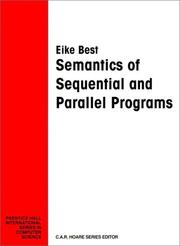| Listing 1 - 3 of 3 |
Sort by
|
Book
ISBN: 9819943663 9819943655 Year: 2023 Publisher: Singapore : Springer Nature Singapore : Imprint: Springer,
Abstract | Keywords | Export | Availability | Bookmark
 Loading...
Loading...Choose an application
- Reference Manager
- EndNote
- RefWorks (Direct export to RefWorks)
This book presents a hybrid static-dynamic approach for efficient performance analysis of parallel applications on HPC systems. Performance analysis is essential to finding performance bottlenecks and understanding the performance behaviors of parallel applications on HPC systems. However, current performance analysis techniques usually incur significant overhead. Our book introduces a series of approaches for lightweight performance analysis. We combine static and dynamic analysis to reduce the overhead of performance analysis. Based on this hybrid static-dynamic approach, we then propose several innovative techniques for various performance analysis scenarios, including communication analysis, memory analysis, noise analysis, computation analysis, and scalability analysis. Through these specific performance analysis techniques, we convey to readers the idea of using static analysis to support dynamic analysis. To gain the most from the book, readers should have a basic grasp of parallel computing, computer architecture, and compilation techniques.
Book
ISBN: 1785885510 9781785885518 1785883240 9781785883248 Year: 2016 Publisher: Birmingham, UK Packt Publishing
Abstract | Keywords | Export | Availability | Bookmark
 Loading...
Loading...Choose an application
- Reference Manager
- EndNote
- RefWorks (Direct export to RefWorks)
Unlock the power of multi-core mobile devices to build responsive and reactive Android applications About This Book Construct scalable and performant applications to take advantage of multi-thread asynchronous techniques Explore the high-level Android asynchronous constructs available on the Android SDK Choose the most appropriate asynchronous technique to implement your next outstanding feature Who This Book Is For This book is for Android developers who want to learn how to build multithreaded and reliable Android applications using high-level and advanced asynchronous techniques and concepts. No prior knowledge of concurrent and asynchronous programming is required. This book will also be great for Java experts who are new to Android. Whether you are a beginner at Android development or a seasoned Android programmer, this book will guide you through the most basic and advanced asynchronous constructs used in Android programming. What You Will Learn Get familiar with the android process model and low-level concurrent constructs delivered by the Android SDK Use AsyncTask and loader framework to load data in the background, delivering progress results in the meantime Create services that interact with your activity without compromising the UI rendering Learn the working of Android concurrency on the Native Layer Interact with nearby devices over Bluetooth and WiFi communications channels Create and compose tasks with RxJava to execute complex asynchronous work in a predictable way Get accustomed to the use of the Android Loader construct to deliver up-to-date results In Detail Asynchronous programming has acquired immense importance in Android programming, especially when we want to make use of the number of independent processing units (cores) available on the most recent Android devices. With this guide in your hands you'll be able to bring the power of Asynchronous programming to your own projects, and make your Android apps more powerful than ever before! To start with, we will discuss the details of the Android Process model and the Java Low Level Concurrent Framework, delivered by Android SDK. We will also guide you through the high-level Android-specific constructs available on the SDK: Handler, AsyncTask, and Loader. Next, we will discuss the creation of IntentServices, Bound Services and External Services, which can run in the background even when the user is not interacting with it. You will also discover AlarmManager and JobSchedule...
Parallel programs (Computer programs) --- Application software. --- Application computer programs --- Application computer software --- Applications software --- Apps (Computer software) --- Computer software --- Parallel computer programs --- Parallel processing (Electronic computers) --- Computer programs --- Android (Electronic resource) --- Android operating system (Electronic resource) --- Android OS (Electronic resource) --- Google Android (Electronic resource) --- Android mobile operating system (Electronic resource)

ISBN: 0134606434 Year: 1996 Publisher: London Prentice Hall
Abstract | Keywords | Export | Availability | Bookmark
 Loading...
Loading...Choose an application
- Reference Manager
- EndNote
- RefWorks (Direct export to RefWorks)
Programming languages (Electronic computers) --- -Computer programming --- 681.3*D31 --- 681.3*F32 --- Computers --- Electronic computer programming --- Electronic data processing --- Electronic digital computers --- Programming (Electronic computers) --- Coding theory --- Programming language semantics --- Semantics --- Formal definitions and theory: semantics; syntax (Programming languages)--See also {681.3*D21}; {681.3*F31}; {681.3*F32}; {681.3*F42}; {681.3*F43} --- Semantics of programming languages: algebraic approaches to semantics; denotational semantics; operational semantics (Logics and meanings of programs)--See also {681.3*D31} --- Programming --- Computer programming. --- Parallel programs (Computer programs) --- Semantics. --- Parallel programs (Computer programs). --- 681.3*F32 Semantics of programming languages: algebraic approaches to semantics; denotational semantics; operational semantics (Logics and meanings of programs)--See also {681.3*D31} --- 681.3*D31 Formal definitions and theory: semantics; syntax (Programming languages)--See also {681.3*D21}; {681.3*F31}; {681.3*F32}; {681.3*F42}; {681.3*F43} --- Computer programming --- Parallel computer programs --- Parallel processing (Electronic computers) --- Computer programs
| Listing 1 - 3 of 3 |
Sort by
|

 Search
Search Feedback
Feedback About UniCat
About UniCat  Help
Help News
News